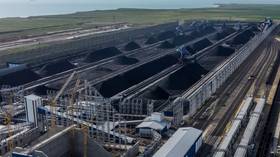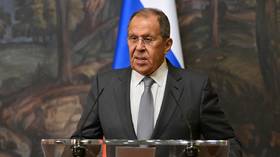Coal prices skyrocket amid rising demand & soaring gas prices

Asian benchmark Australian thermal coal at Newcastle Port has seen an unprecedented 106% gain in prices in 2021. In stark contrast, international oil benchmark Brent crude gained only 33% this year.
The price of coal soared to more than $166 per metric ton, according to the latest report by market data provider Argus. The Newcastle weekly index, which stood at $46.18 in September 2020, now stands at its all-time high of $195.20 from July 2008.
Also on rt.com China restarts coal mines to keep up with power demandThe Richards Bay index, Newcastle’s South African equivalent, also jumped more than 55% this year, closing at $137.06 per metric ton last week.
According to Yulia Buchneva, Fitch ratings agency’s director in natural resources, thermal coal remains one of the main global energy sources with an over 35% share in power generation worldwide.
“We expect that the share of coal in energy generation will decline driven by the energy transition agenda, however this will have a rather longer-term impact on the market. In the medium-term, demand for coal in emerging markets with less strict environmental agenda, in particular in India, Pakistan, and Vietnam, where coal-fired power dominates generation, is expected to rise,” Buchneva told CNBC, noting that Europe and the US represent a mere 10% of worldwide coal demand.
“The current high thermal coal prices have decoupled from costs and are therefore not sustainable. We expect that prices will normalize during the remainder of the year,” she added.
Also on rt.com Natural gas prices still have room to runFitch Ratings expects the price of Australian coal to drop toward $81 by year’s end.
Thermal coal is burned to generate electricity. It is the most carbon-intensive fossil fuel, with a high level of emissions. Argus analysts claim coal prices were impacted by high electricity demand and a surge in global gas prices due to the Covid-19 pandemic, combined with unseasonably low gas storages in Europe and low gas imports.
For more stories on economy & finance visit RT's business section













